"I Was Privileged to Clean the Home of Rabbi Chaim Kanievsky, and I Witnessed Open Miracles"
Shani Sara Barhum regularly cleaned the home of the late Rabbi Chaim Kanievsky every Friday. As the 30-day commemoration of his passing approaches, she shares her longing and the miracles she witnessed.
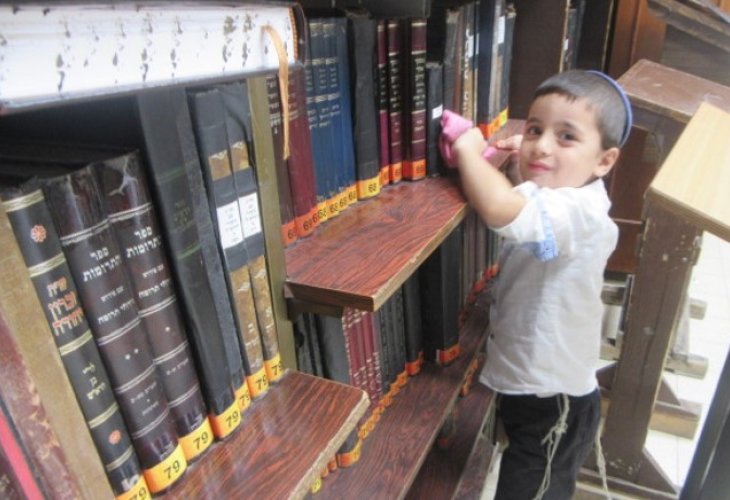 Shani Sara's son arranging books at Rabbi Chaim Kanievsky's home
Shani Sara's son arranging books at Rabbi Chaim Kanievsky's home"For the past six years, I was privileged to clean the home of the great Rabbi Chaim Kanievsky every Friday morning." Shani Sara Barhum casts this meaningful sentence into the air, then falls silent.
This silence seems to convey so much that words can't express – the immense privilege that enveloped her, the understanding that she was part of something so significant, and the unimaginable pain and sorrow for the loss of this great tzadik, and those special six years that have ended and will not return.
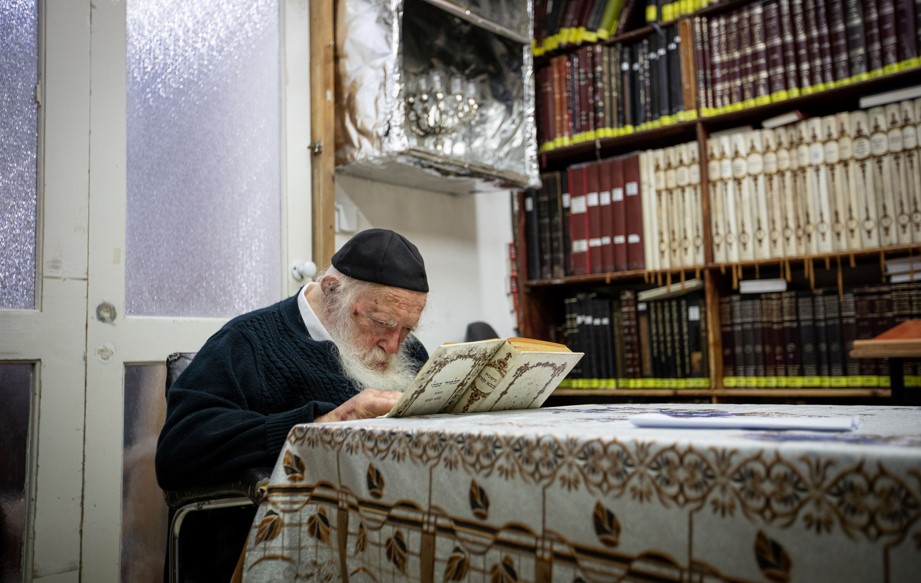 (Photo: Aharon Krohn / Flash 90)
(Photo: Aharon Krohn / Flash 90)Cleaning and Earning Merit
So how did it start? How did you get this role?
"For a long time, we did not have children," she shares. "My husband and I went through very trying times of waiting. Then my husband went to receive a blessing from the rabbi, and the rabbi recited the verse to him 'A man is satisfied with the fruit of his mouth,' explaining that when a person writes Torah insights, they are blessed with children. My husband began writing Torah insights, and meanwhile, I felt that I also wanted to do something significant to gain merits for myself. Just as I heard from my sister that the rabbi's house was looking for help early Friday mornings, I thought it would fit me perfectly. So I took on the role and started cleaning regularly every Friday after the vatikim prayer. I did the work with another woman, and during those days, I indeed became pregnant, and we had a son after six years of waiting."
The excitement that filled her every time she arrived at the rabbi's home is hard to describe in words. "I arrived at 7:30 in the morning, after the vatikim prayer," Shani Sara recalls, "and even while going up the steps, I would murmur 'Psalm of Thanksgiving,' thanking Hashem for the privilege granted to me – to clean the home of such a great tzadik. Generally, we were responsible for cleaning the entrance area and the study room; we did not go inside the house. These were hours when the rabbi generally slept after finishing his morning prayers.
"We had to finish the work quickly, as soon after the rabbi woke up, he had a packed schedule with study partners and receiving visitors. But there were times when the rabbi wasn't asleep, and we saw him sitting and learning. I recall the last week before he passed away, someone came to him seeking a blessing before some trial. The rabbi was weak, but he reviewed the documents and said, 'There is no basis for the lawsuit against you; it will be fine,' and blessed him, and indeed, he was acquitted."
And she saw something else: "The rabbi's home was a house of kindness, and people who came were always welcomed warmly, with appreciation and respect. They never checked who someone was or what he did; they respected everyone."
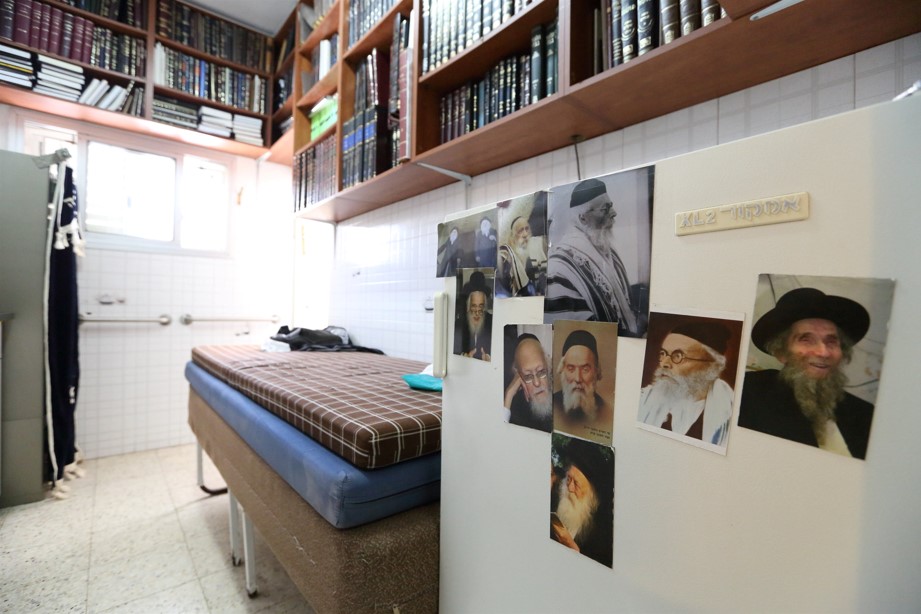 The kitchen in the rabbi's house (Photo: Yaakov Naumi / Flash 90)
The kitchen in the rabbi's house (Photo: Yaakov Naumi / Flash 90)What exactly did your role include?
"We dusted the shelves and the books the rabbi studied from, and also the holy chair of the Steipler – a chair known for its significant segulah virtues. Naturally, we mopped the floor and really strived to reach every corner. Every Erev Chag was interesting to see the special items on the table – the menorah prepared for the rabbi, the symbols of Rosh Hashanah, and so on.
"One of the unique things was the respect given to the notes – the kvitlach that the rabbi received throughout the week from people for blessings. It was explained to us that under no circumstances were they to be thrown away; they were sent for proper disposal."
Did you ever have to miss a day of work?
"Hardly ever. Although, after my child was born, I brought someone to temporarily replace me, but I made it clear that it was a temporary replacement. After about a month, I returned to the role. Meanwhile, the one who filled my spot was waiting for a match, and eventually, the other woman who cleaned with me and I ended up becoming matchmakers, so she too was helped because of the rabbi's house.
"Since my son was born, I have brought him with me to work, and he knows well that when we arrive at the rabbi's house, we must maintain absolute silence and not run around. I feel it is really girsa d'yankuta for him. He is growing up with it."
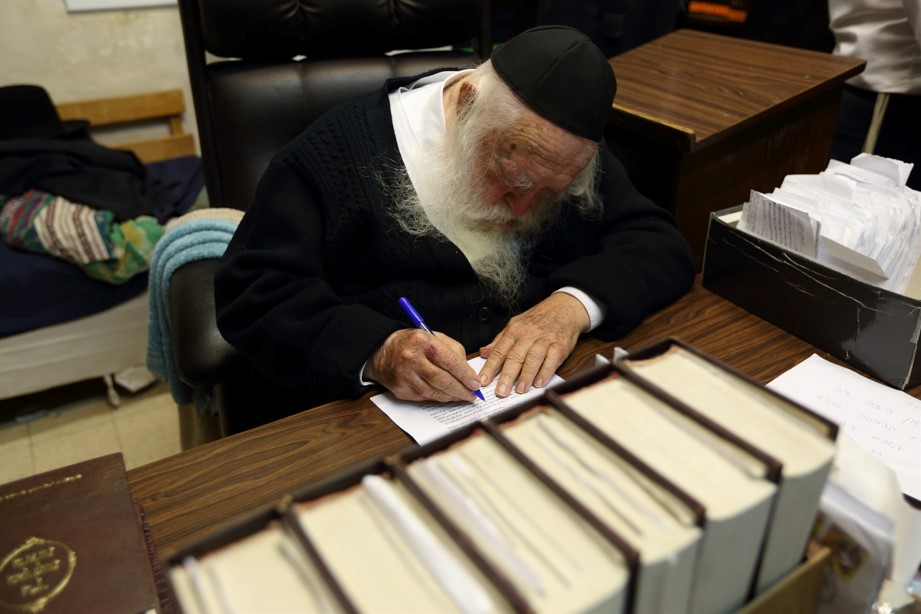 (Photo: Yaakov Naumi / Flash 90)
(Photo: Yaakov Naumi / Flash 90)
Calm, Without Pressure
What were Fridays like at the rabbi's house?
"Until Corona, a cook came with us as well, and while we were cleaning – she cooked and prepared dishes in the small kitchen located in the inner part of the apartment. As I mentioned – the rabbi would sleep a little, and later, study partners awaited him. During cleaning hours, there were almost no people in the house, except for the rabbi's grandson, who never left his side.
"One thing I never remember from the rabbi's home is stress. There was never any stress there on Fridays, not during winter Shabbatot or summer Shabbatot, not even on Erev good holidays. The atmosphere was always pleasant, and the sense was that the most important thing in that place was Torah study and nothing else. Within the walls of the house blew a spirit of holiness, it was very moving. I still can't believe that I was granted entrance into this sacred space every week to see it up close."
And what about Passover cleaning? Were you responsible for that as well?
"In previous years, we cleaned thoroughly the entire entrance and study room the week before Passover. There is a large couch there, and it was very important to the rabbi that no chametz was embedded in it at all, and that we clean it well with cleaning agents for assurance against any doubt."
Did you ever have a chance to speak with the rabbi or hear something from him directly?
"The rabbi, as is known, did not speak at all with women, but it doesn't seem he saw us either. Because if he was awake, he was absorbed in learning. But his grandchildren greatly thanked us, and sometimes granddaughters came to convey their gratitude. We always felt a great sense of appreciation towards us.
"I remember one day the rabbi was suffering from an eye infection, and his daughter, rebbetzin Kolodetzky, came to visit him and fulfill the mitzvah of visiting the sick. She entered the study room and sat next to him without saying a word and without interrupting. She waited for him to notice her himself. It was fascinating to see her respect for her parents.
"It's clear to me that the merit is entirely mine," emphasizes Shani Sara, "this is also the reason I took on this task, which over the years became more and more complex. I work as a teacher during the week and needed to take a day off on Friday to clean the rabbi's house. I also don't live in Bnei Brak, but in Petah Tikva, which means there are travel times involved, all on a Friday which is busy for all of us. But over time I discovered that when a person does something good, Hashem helps them. Each week anew, I saw great siyata dishmaya in preparing for Shabbat, and I managed to accomplish so much in a short time."
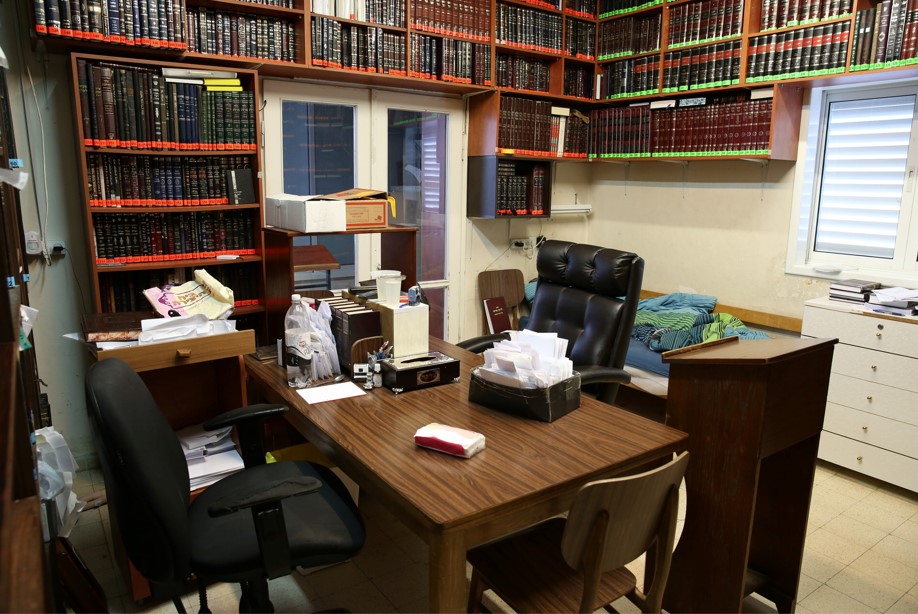 The study room (Photo: Yaakov Cohen / Flash 90)
The study room (Photo: Yaakov Cohen / Flash 90)Days Never to Be Forgotten
On Friday the 15th of Adar B', Shushan Purim, the day of the passing of Rabbi Chaim Kanievsky, Shani Sara came as usual to clean the rabbi's home. "I knew the rabbi wasn't feeling well; for the past few months, it had been said that he was weak. But no one had the slightest idea that this would be his last day. The Book of Esther from the day before still lay on the table, and we cleaned around it, without touching it. Then we went home, not imagining anything might happen. We never thought this was the last time we would clean this sacred home."
Shani Sara notes that they returned to cleaning exactly after Passover last year after taking a break due to the Corona period. "I was so happy to return to work," she adds honestly. "During the period we did not go, I felt a big void, and the truth is that I still feel that void. Personally, I feel as if I've lost a close father, and I'm not sure what will be from now on, how I will continue with life. In the past few weeks, I woke up on Friday mornings and simply didn't understand what I was supposed to do with the free hours. After all, these are hours when I should be at the rabbi's place, doing nothing else.
"One day last week, I couldn't resist, and as I passed through Bnei Brak, my feet led me to the rabbi's home. I entered there and was met with very heavy silence; everything was so desolate. I couldn't bear to see the house like that and fled outside."
Shani Sara's voice becomes choked as she adds, "I will never forget this wonderful time when I was privileged to serve the greatest of the generation. These are days that will accompany me forever, and hopefully, they will stand to my credit, and the rabbi, who was all about learning and holiness, will be an advocate for all of us from above."

